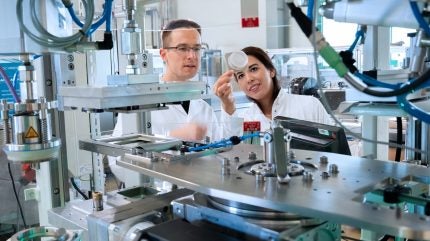
Researchers at the Fraunhofer Institute for Process Engineering and Packaging IVV are working with over 50 partners to develop artificial intelligence (AI) solutions aimed at improving the recyclability of plastic packaging.
The KIOptiPack project, part of Germany’s AI Application Hub on Plastic Packaging, focuses on using AI to optimise packaging design and processing while integrating recycled materials to meet upcoming EU regulations.

Discover B2B Marketing That Performs
Combine business intelligence and editorial excellence to reach engaged professionals across 36 leading media platforms.
Collaborative data systems aim to improve recycling rates
Through AI-based optimisation tools and a shared data space, KIOptiPack is enabling better design-for-recycling strategies.
This approach connects data from across the plastics value chain, including material properties, production methods and product specifications.
Researchers say the tools help balance functionality, design, manufacturability and environmental impact while meeting legal requirements—such as the EU target for packaging to include at least 35% recycled plastic by 2030.
The integrated system evaluates packaging options and suggests designs that minimise material use while maintaining performance. “A shared data space is crucial,” says Fraunhofer IVV director Andrea Büttner. “Recycled plastic is valuable, but it must be free from contaminants like inks or incompatible polymers.”

US Tariffs are shifting - will you react or anticipate?
Don’t let policy changes catch you off guard. Stay proactive with real-time data and expert analysis.
By GlobalDataThe tools facilitate a common language among stakeholders and improve transparency in polyolefin recycling, a material group that dominates plastic packaging.
AI supports quality control and material matching
Artificial intelligence is also used to match recycled materials with suitable applications. Fraunhofer IVV’s modular software solutions assess fluctuating material properties and propose processing methods that account for variability.
This includes real-time suggestions during production, allowing manufacturers to adjust processes based on the composition of recycled inputs.
For example, the system can determine how to turn inconsistent recycled material into packaging such as yoghurt pots with uniform wall thickness and shape. The team also employs AI-driven chromatography techniques to screen out unsuitable materials before they re-enter the manufacturing cycle.
Addressing the shortfall in recycled plastic supply
Despite a steady rise in the use of recycled plastics, supply is not expected to meet future demand.
By 2030, recycled material availability could fall short by 30% compared to projected needs. Fraunhofer IVV and its partners argue that AI integration and cross-sector collaboration will be key to closing this gap.
“We’re linking information and material flows to respond to resource shortages,” says Büttner. Experts across the plastics and packaging sectors will gather at the Zukunftsforum Kunststoffkreislauf conference in Berlin in July to discuss next steps toward a circular economy for packaging.
The AI Application Hub includes two labs: KIOptiPack, focused on packaging design and production, and K3I-Cycling, which addresses recycling and sorting.
Both aim to create a connected infrastructure that enables scalable, sustainable packaging solutions aligned with environmental and regulatory goals.





